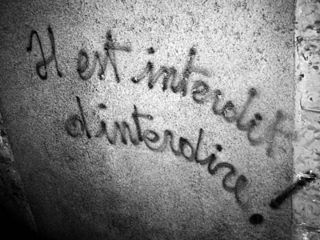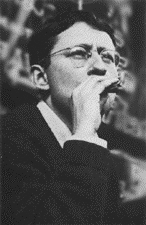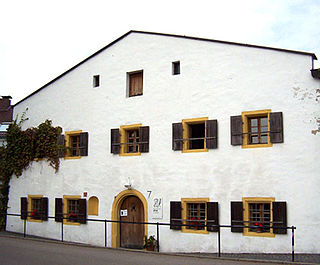
The Situationist International (SI) was an international organization of social revolutionaries made up of avant-garde artists, intellectuals, and political theorists. It was prominent in Europe from its formation in 1957 to its dissolution in 1972. The intellectual foundations of the Situationist International were derived primarily from libertarian Marxism and the avant-garde art movements of the early 20th century, particularly Dada and Surrealism. Overall, situationist theory represented an attempt to synthesize this diverse field of theoretical disciplines into a modern and comprehensive critique of mid-20th century advanced capitalism.

Ralph Rumney was an English artist, born in Newcastle Upon Tyne.

Guy-Ernest Debord was a French Marxist theorist, philosopher, filmmaker, critic of work, member of the Letterist International, founder of a Letterist faction, and founding member of the Situationist International. He was also briefly a member of Socialisme ou Barbarie.

The Letterist International (LI) was a Paris-based collective of radical artists and cultural theorists between 1952 and 1957. It was created by Guy Debord and Gil J. Wolman rejoined by Jean-Louis Brau and Serge Berna as a schism from Isidore Isou's Lettrist group. The group went on to join others in forming the Situationist International, taking some key techniques and ideas with it.

Psychogeography is the exploration of urban environments that emphasizes interpersonal connections to places and arbitrary routes. It was developed by members of the Letterist International and Situationist International, which were revolutionary groups influenced by Marxist and anarchist theory as well as the attitudes and methods of Dadaists and Surrealists. In 1955, Guy Debord defined psychogeography as "the study of the precise laws and specific effects of the geographical environment, consciously organized or not, on the emotions and behavior of individuals." One of the key tactics for exploring psychogeography is the loosely defined urban walking practice known as the dérive. As a practice and theory, psychogeography has influenced a broad set of cultural actors, including artists, activists and academics.
Walter Olmo was an Italian musician and composer. In 1957 he wrote Towards a Conception of Musical Experimentation. He advocated avant-garde electronic and contemporary music. In his 1975 he published the essay La fine della preistoria musicale.
Piero Simondo was an Italian artist born in Cosio di Arroscia, Liguria, Italy.
André Frankin was a Belgian Lettrist and Situationist.

The dérive is an unplanned journey through a landscape, usually urban, in which participants drop their everyday relations and "let themselves be drawn by the attractions of the terrain and the encounters they find there". Developed by members of the Letterist International, it was first publicly theorized in Guy Debord's "Theory of the Dérive" (1956). Debord defines the dérive as "a mode of experimental behaviour linked to the conditions of urban society: a technique of rapid passage through varied ambiances."

The Society of the Spectacle is a 1967 work of philosophy and Marxist critical theory by Guy Debord, in which the author develops and presents the concept of the Spectacle. The book is considered a seminal text for the Situationist movement. Debord published a follow-up book Comments on the Society of the Spectacle in 1988.

Gruppe SPUR was an artistic collaboration formed by the German painters Heimrad Prem, Helmut Sturm, and Hans-Peter Zimmer, and the sculptor Lothar Fischer in 1957. They published a journal of the same name Spur.

Michèle Bernstein is a French novelist and critic, most often remembered as a member of the Situationist International from its foundation in 1957 until 1967, and as the first wife of its most prominent member, Guy Debord.

Cosio di Arroscia is a comune (municipality) in the province of Imperia in the Italian region Liguria, located about 100 kilometres (62 mi) southwest of Genoa and about 25 kilometres (16 mi) northwest of Imperia.

The spectacle is a central notion in the Situationist theory, developed by Guy Debord in his 1967 book The Society of the Spectacle. In the general sense, the spectacle refers to "the autocratic reign of the market economy which had acceded to an irresponsible sovereignty, and the totality of new techniques of government which accompanied this reign." It also exists in a more limited sense, where spectacle means the mass media, which are "its most glaring superficial manifestation." Debord said that the society of the spectacle came to existence in the late 1920s.

Ken Knabb is an American writer, translator, and radical theorist, known for his translations of Guy Debord and the Situationist International. His own English-language writings, many of which were anthologized in Public Secrets (1997), have been translated into over a dozen additional languages. He is also a respected authority on the political significance of Kenneth Rexroth.

Situationist prank is a term used in the mass media to label a distinctive tactic by the Situationist International, consisting of setting up a subversive political prank, hoax or stunt; In the terminology of the Situationist International, stunts and media pranks are very similar to situations. The détournement technique, that is "turning expressions of the capitalist system against itself," was the essential element of a situationist prank. The Situationist tactic of using détournement for subversive pranks is such a distinctive and influential aspect of the Situationist International, that they are sometimes labeled as a group of political pranksters.
The Council for Maintaining the Occupations, or CMDO, was a revolutionary committee formed during the May 1968 events in France originating in the Sorbonne. The council favored the continuation of wildcat general strikes and factory occupations across France, maintaining them through directly democratic workers' councils. Within the revolutionary movement, it opposed the influence of major trade unions and the French Communist Party who intended to contain the revolt and compromise with General Charles de Gaulle.
Situation is a concept developed by French philosopher Jean-Paul Sartre. It refers to "how ritualized action might be avoided or at least confronted consciously as contrary to the subject's freedom of nihilation". It was first expressed in his 1943 work Being and Nothingness, where he wrote that:
[T]here is freedom only in a situation, and there is a situation only through freedom [...] There can be a free for-itself only as engaged in a resisting world. Outside of this engagement the notions of freedom, of determination, of necessity lose all meaning.

Socialisme ou Barbarie was a French-based radical libertarian socialist group of the post-World War II period whose name comes from a phrase which was misattributed to Friedrich Engels by Rosa Luxemburg in the Junius Pamphlet, but which probably was most likely first used by Karl Kautsky. It existed from 1948 until 1967. The animating personality was Cornelius Castoriadis, also known as Pierre Chaulieu or Paul Cardan. Socialisme ou Barbarie is also the name of the group's journal.
The Situationist International's interpretation of the Paris Commune of 1871 was influenced by their collaboration with Henri Lefebvre with whom they had been in contact since the late 1950s. Lefebvre’s writings on revolutionary romanticism and everyday life were important influences on the early SI. In the early 1960s Guy Debord, Attila Kotányi and Raoul Vaneigem agreed to assist Lefebvre in his preparations for a book on the Commune. The results of their brainstorming sessions were written down in 1962 by the SI in their “Theses on the Paris Commune.” After Lefebvre published his respective notes on their collaboration, in a 1962 piece entitled “La Signification de la Commune,” the two parties had a falling out as the SI ostensibly disagreed with the journal in which he published. Both the SI and Lefebvre published extensively on the feud in the following decade.









